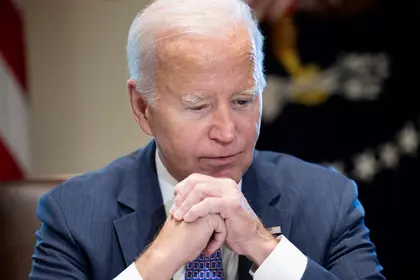President Joe Biden called key allies Tuesday, Oct. 3, to reassure them of continued US support for Ukraine, even as renewed political chaos in Washington placed fresh military aid in deeper jeopardy.
Biden spoke with Western leaders to calm nerves after new assistance for Ukraine was dropped from a deal in the US Congress to avoid a government shutdown on Saturday, amid opposition from hardline Republicans.
JOIN US ON TELEGRAM
Follow our coverage of the war on the @Kyivpost_official.
But Democrat Biden's hopes of quickly pushing through a new bill for Ukraine were plunged into disarray shortly after Tuesday's call, when the same hardliners axed Republican House Speaker Kevin McCarthy in a rebellion.
With the turmoil threatening to hold up any legislative work, Biden urged the quick election of a new speaker to confront the "urgent challenges facing our nation," the White House said.
The US president had earlier called the leaders of key allies Britain, Canada, Germany, Italy, Japan, Poland, Romania, the heads of the EU and NATO, and the foreign minister of France.
"President Biden reaffirmed the United States’ commitment to supporting Ukraine for as long as it takes as it defends its sovereignty and territorial integrity, with fellow leaders echoing their commitments," said the White House.
- 'Not our friend' -
Yet the White House itself made the urgency of the situation clear.
National Security Council spokesman John Kirby warned that if fresh aid is not approved, existing funds to help Ukraine fight Russian President Vladimir Putin's invasion will only last "a couple of months."

Poland Assumes Presidency of the Council of the European Union
"Time is not our friend," Kirby told reporters. A lapse in funding would not only harm Ukraine on the battlefield but "make Putin believe that he can wait us out."
The Pentagon said it could keep meeting Ukraine's military needs a "just a little bit longer" with assistance that has already been authorized.
Allies rushed after the call to show a united front with Biden, whose country is by far the largest supplier of aid to Ukraine.
Washington has committed more than $43 billion in military assistance to Kyiv since Moscow launched its full-scale invasion in February 2022. Congress has approved a total of $113 billion in aid including humanitarian help.
Italian Prime Minister Giorgia Meloni's office said Biden was "keen to reassure the allies about the continuing American support for Ukraine" after the shutdown drama.
British Prime Minister Rishi Sunak thanked Biden for his "leadership," adding that Western support would continue for "as long as it takes."
NATO leader Jens Stoltenberg "stressed the importance of continued support to Ukraine" and added that the alliance's members were "sharing the burden equitably."
- 'Indispensible nation' -
Russia has pounced on the chaos in Washington, with the Kremlin saying on Monday that Western war fatigue would grow due to the uncertainty over US assistance for Ukraine.
Biden has said the global role of the United States is at stake, saying on social media "we are the indispensable nation in the world -- let’s act like it."
The Ukraine aid now looks set to be held hostage to US politics with just over a year until elections, as the far-right Republicans who ousted speaker McCarthy have put stopping aid to Ukraine at the top of their agenda.
The chaos comes after Ukrainian President Volodymyr Zelensky visited Washington in September to plead for continued backing.
Opposition among hardline Republicans has been spreading more than a year and a half into Russia's invasion, including to some voters.
An ABC/Washington Post poll released September 24 showed 41 percent of respondents saying the United States was doing too much to support Ukraine, up from 33 percent in February and just 14 percent in April 2022.
Doubts about Western unity have also grown after Slovakia elected populist leader Robert Fico -- who has pledged to end military support for Ukraine -- as prime minister at the weekend.
You can also highlight the text and press Ctrl + Enter






